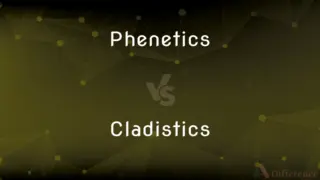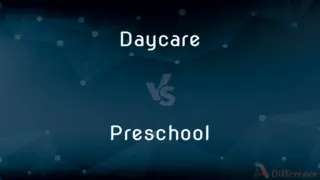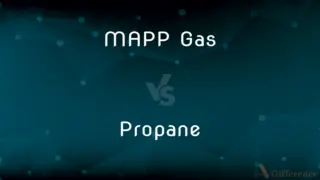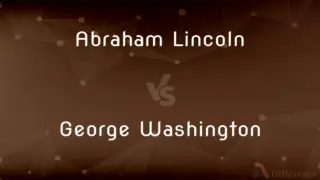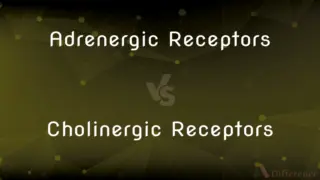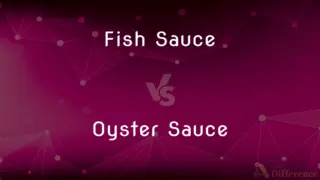Need vs. Requirement — What's the Difference?
Edited by Tayyaba Rehman — By Urooj Arif — Updated on April 1, 2024
A need is a basic or essential desire that stems from a sense of lack, while a requirement is a specified necessity, often formalized, for a particular purpose or standard.

Difference Between Need and Requirement
Table of Contents
ADVERTISEMENT
Key Differences
Needs are fundamental or psychological desires that individuals or systems have to ensure well-being or functionality, driven by an intrinsic sense of lack or deprivation. In contrast, requirements are specific criteria or conditions that must be met for a certain objective, project, or standard, often delineated in a formal or structured manner.
While needs are more general and can be subjective, varying widely among individuals or systems based on their circumstances or states, requirements are objective, delineated, and often documented, serving as benchmarks or guidelines that dictate specific expectations or stipulations.
The concept of need encompasses a broad spectrum, ranging from physical necessities like food and shelter to psychological needs such as love and esteem, emphasizing the essential aspects to sustain life or maintain quality. Requirements, however, pertain to detailed stipulations or conditions that are laid out to achieve or maintain a certain level of performance, quality, or compliance, highlighting their role in ensuring specific outcomes or standards are met.
In the context of product development, a need might refer to the market's or individual's underlying problem or desire that a product seeks to address or fulfill. On the other hand, a requirement would be a detailed specification or feature that the product must possess to meet these needs effectively, often resulting from analysis or design processes.
Needs often serve as the basis for identifying requirements; the process of understanding and defining needs can lead to the formulation of specific requirements. For example, the need for safe drinking water could lead to the requirement for a water purification system to remove specific contaminants to a defined level of purity.
ADVERTISEMENT
The fulfillment of needs is generally associated with achieving a state of satisfaction or well-being, while meeting requirements is associated with achieving a state of compliance, efficiency, or effectiveness within a defined framework or set of standards.
Comparison Chart
Definition
A basic or essential desire stemming from a lack.
A specified necessity for a particular purpose or standard.
Nature
General, can be subjective.
Specific, objective, often formalized.
Scope
Broad, ranging from physical to psychological aspects.
Detailed, pertaining to particular objectives or standards.
Examples
Food, shelter, affection.
Technical specifications, legal stipulations.
Context
Can be personal or systemic.
Often project-specific or standards-based.
Outcome
Satisfaction, well-being.
Compliance, efficiency, effectiveness.
Compare with Definitions
Need
Often identified through introspection or societal norms.
Societal changes can influence the perception of needs.
Requirement
A condition or capability needed by a user to solve a problem or achieve an objective.
Software development projects have specific functional requirements.
Need
Can vary greatly among individuals or communities.
The need for personal space can differ culturally.
Requirement
Meeting requirements is necessary for approval or success.
Manufacturers must meet safety requirements to sell products.
Need
Encompasses a wide range of human desires and necessities.
Emotional support is as much a need as physical sustenance.
Requirement
Clearly defined, measurable, and often documented.
Building codes specify minimum requirements for construction safety.
Need
Fulfillment results in a sense of well-being or contentment.
Meeting the need for belonging improves mental health.
Requirement
Typically results from analysis, regulation, or design processes.
Stakeholder meetings help identify project requirements.
Need
An essential requirement or necessity for survival or well-being.
Humans have a basic need for clean water and air.
Requirement
Tailored to particular goals, standards, or conditions.
Each department has its own set of requirements for new hires.
Need
A need is something that is necessary for an organism to live a healthy life. Needs are distinguished from wants.
Requirement
In product development and process optimization, a requirement is a singular documented physical or functional need that a particular design, product or process aims to satisfy. It is commonly used in a formal sense in engineering design, including for example in systems engineering, software engineering, or enterprise engineering.
Need
A condition or situation in which something must be supplied in order for a certain condition to be maintained or a desired state to be achieved
Crops in need of water.
A child's need for affection.
Requirement
A thing that is needed or wanted
Choose the type of window that suits your requirements best
Need
Something required or wanted; a requisite
"Those of us who led the charge for these women's issues ... shared a common vision in the needs of women" (Olympia Snowe).
Requirement
Something that is required; a necessity.
Need
Necessity; obligation
There is no need for you to go.
Requirement
Something obligatory; a prerequisite.
Need
A condition of poverty or misfortune
The family is in dire need.
Requirement
A necessity or prerequisite; something required or obligatory. Its adpositions are generally of in relation to who or what has given it, on in relation to whom or what it is given to, and for in relation to what is required.
There was a requirement of the government on citizens for paying taxes.
Need
To be under the necessity of or the obligation to
They need not come. You needn't be concerned.
Requirement
Something asked.
Need
To have need of; require
The family needs money. We need to get some more paint.
Requirement
A statement (in domain specific terms) which specifies a verifiable constraint on an implementation that it shall undeniably meet or (a) be deemed unacceptable, or (b) result in implementation failure, or (c) result in system failure.
Need
To have an obligation (to do something)
You need to clean up your room.
Requirement
The act of requiring; demand; requisition.
Need
To be subject (to an action) by obligation
Bags need to be stowed underneath the seat in front of you.
Requirement
That which is required; an imperative or authoritative command; an essential condition; something needed or necessary; a need.
One of those who believe that they can fill up every requirement contained in the rule of righteousness.
God gave her the child, and gave her too an instinctive knowledge of its nature and requirements.
Need
To want to be subject to
We don't need another lecture on the subject.
Requirement
Required activity;
The requirements of his work affected his health
There were many demands on his time
Need
To be in need or want.
Requirement
Anything indispensable;
Food and shelter are necessities of life
The essentials of the good life
Allow farmers to buy their requirements under favorable conditions
A place where the requisites of water fuel and fodder can be obtained
Need
To be necessary.
Requirement
Something that is required in advance;
Latin was a prerequisite for admission
Need
A requirement for something; something needed.
There's no need to speculate; we can easily find out for sure.
She grew irritated with his constant need for attention.
Our needs are not being met.
I've always tried to have few needs beyond food, clothing and shelter.
Need
Lack of means of subsistence; poverty; indigence; destitution.
Need
(transitive) To have an absolute requirement for.
Living things need water to survive.
Need
(transitive) To want strongly; to feel that one must have something.
After ten days of hiking, I needed a shower and a shave.
Need
(modal verb) To be obliged or required (to do something).
You need not go if you don't want to.
Need
(intransitive) To be required; to be necessary.
Need
To be necessary (to someone).
Need
A state that requires supply or relief; pressing occasion for something; necessity; urgent want.
And the city had no need of the sun.
I have no need to beg.
Be governed by your needs, not by your fancy.
Need
Want of the means of subsistence; poverty; indigence; destitution.
Famine is in thy cheeks;Need and oppression starveth in thine eyes.
Need
That which is needful; anything necessary to be done; (pl.) necessary things; business.
Need
Situation of need; peril; danger.
Need
To be in want of; to have cause or occasion for; to lack; to require, as supply or relief.
Other creatures all day longRove idle, unemployed, and less need rest.
Need
To be wanted; to be necessary.
When we have done it, we have done all that is in our power, and all that needs.
Need
Of necessity. See Needs.
Need
A condition requiring relief;
She satisfied his need for affection
God has no need of men to accomplish His work
There is a demand for jobs
Need
Anything that is necessary but lacking;
He had sufficient means to meet his simple needs
I tried to supply his wants
Need
The psychological feature that arouses an organism to action toward a desired goal; the reason for the action; that which gives purpose and direction to behavior;
We did not understand his motivation
He acted with the best of motives
Need
A state of extreme poverty or destitution;
Their indigence appalled him
A general state of need exists among the homeless
Need
Require as useful, just, or proper;
It takes nerve to do what she did
Success usually requires hard work
This job asks a lot of patience and skill
This position demands a lot of personal sacrifice
This dinner calls for a spectacular dessert
This intervention does not postulates a patient's consent
Need
Have need of;
This piano wants the attention of a competent tuner
Need
Have or feel a need for;
Always needing friends and money
Common Curiosities
Can a requirement evolve from a need?
Yes, identifying and analyzing needs can lead to the formulation of specific requirements to address those needs effectively.
How do needs and requirements differ in a project?
Needs in a project refer to the underlying problems or goals it aims to address, while requirements are the detailed conditions or criteria the project must fulfill to meet those needs.
What defines a requirement?
A requirement is a specific condition or specification that must be met for a particular purpose, project, or standard.
What role do requirements play in product development?
Requirements in product development specify what a product must do or have to satisfy market needs, ensuring its effectiveness and compliance with standards.
How are requirements documented?
Requirements are documented in various forms, such as technical specifications, user stories, or regulatory guidelines, depending on the project or field.
Are requirements always formalized?
Requirements are often formalized, especially in technical or professional contexts, to ensure clarity and measurability, but informal requirements can exist in less structured scenarios.
What is a need?
A need is an intrinsic desire or necessity essential for an individual's or system's survival, well-being, or functionality.
Is it possible for something to be a need and a requirement?
While a need and a requirement are conceptually different, certain elements can be both, especially in contexts where a basic necessity must meet specific criteria to be effective.
Why is it important to distinguish between needs and requirements?
Distinguishing between them is crucial for effective planning, design, and resource allocation, ensuring that essential desires are met and specific criteria are satisfied.
How are needs identified?
Needs are identified through introspection, observation, feedback, or analysis of a situation or system's lacking aspects.
How can failing to meet needs or requirements impact a project?
Failing to meet needs can result in a product or project that does not solve the intended problems, while failing to meet requirements can lead to non-compliance, inefficiencies, or failure to achieve objectives.
How does the concept of need differ in various disciplines?
In psychology, a need might relate to emotional well-being, while in economics, it might concern resources essential for survival; the interpretation depends on the context.
Can the perception of what constitutes a need change over time?
Yes, societal, technological, and individual changes can influence the perception of needs, reflecting evolving priorities and conditions.
What is the importance of accurately defining requirements?
Accurate definition of requirements is crucial for designing solutions that are effective, compliant, and capable of meeting intended goals, avoiding misunderstandings and rework.
What challenges arise in distinguishing between needs and requirements?
Challenges include accurately interpreting needs, translating them into specific and measurable requirements, and ensuring that these requirements remain aligned with the underlying needs throughout a project or product development cycle.
Share Your Discovery

Previous Comparison
Trust vs. Belief
Next Comparison
Archipelago vs. IslandAuthor Spotlight
Written by
Urooj ArifUrooj is a skilled content writer at Ask Difference, known for her exceptional ability to simplify complex topics into engaging and informative content. With a passion for research and a flair for clear, concise writing, she consistently delivers articles that resonate with our diverse audience.
Edited by
Tayyaba RehmanTayyaba Rehman is a distinguished writer, currently serving as a primary contributor to askdifference.com. As a researcher in semantics and etymology, Tayyaba's passion for the complexity of languages and their distinctions has found a perfect home on the platform. Tayyaba delves into the intricacies of language, distinguishing between commonly confused words and phrases, thereby providing clarity for readers worldwide.














